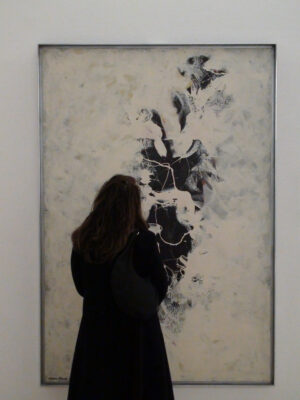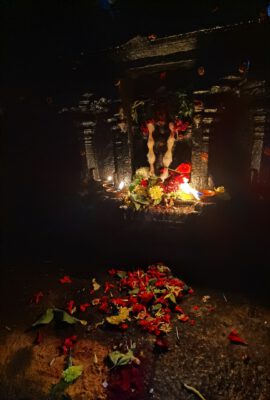II have changed my world view perhaps 4 or 5 times in my life. It's an exciting, thrilling and extremely exhausting process. I think that's a lot, some people may never have left the world view they were born into. Studying philosophy actually requires this. You shouldn't do it too often, and ideally you grow with every new change.
In order to say goodbye to a world view and embrace a new one, you have to leave many ideas behind. It is not easy to say goodbye to ideas that have guided you for years. It's not as if you wake up one day and think everything you've been convinced of for years is wrong. Rather, a feeling creeps in that something is wrong, that certain questions are still unanswered, that things you found interesting suddenly become boring. For me, the mantra is similar. Over the last few years, for example, I have had one thought almost every day: 'I am done with capitalism'. But what does that mean?
The transition
For me, this meant that I could no longer support certain things. In practical terms, I no longer felt comfortable working for an expensive private university. I was also no longer interested in things that purely followed the logic of capital, which also meant that I lost interest in certain topics. I looked at the many shelves of my books and found very few of them interesting ... At the same time, I was attracted to new ideas. Specifically the books by Sri Aurobindo. I've been reading him slowly, but only him, for years ... His ideas take me into a completely different world of thought and experience. I am then very careful. Some authors are seducers, have quick answers and try to impose a world of thought in a somewhat missionary way. I find that dangerous. You have to be careful.
How can you build new beliefs that contradict old beliefs? In order to let go of old beliefs, I simplify them. I ask myself, what is the core and why have they lost their appeal for me? I reduce complexity, simplify in order to gain clarity. That is the beauty of Simplicity. Since my world views have always consisted of solid philosophical systems, I could not simply find fleeting errors in my thinking. Rather, I am interested in weighing up the implications. What does a worldview mean for the planet? Or which questions within a worldview come up short, or are only dealt with evasively? My small category of Kiss goodbye entries here is a small collection of anecdotes.
So today I realized something. As I said, this is about radical simplifications. Reading Aurobindo's commentaries on the Isha Upanishad, I have the feeling that it is all clear, that something is being expressed here that contains a higher truth. I find that almost uncanny, because the world of thought is complex, comes from a different culture, assumes an incredible amount, and you can't really understand it if you don't know Sanskrit. I am therefore infinitely grateful that I can read these texts here with a friend who is not only a real Sanskrit expert, but is also a kind of guru for me, who gives me orientation in my attempt to find my way around Aurobindo's world of thought. So today I realized something. In the great traditions of thought in the West, there are different basic attitudes. A kind of axiomatics, i.e. fundamental assumptions on which everything is based. I am familiar with the following traditions of thought, for example:
- A world view based on Empiricism in other words, on things that are given to me through experience. These experiences are the starting point for understanding the world. Everything that is given in my experience must be rationally explainable. 'Trust only your senses' is the short-sighted mantra. This world view is dominant because it has become the driving force, especially outside philosophy. Politics, economics and the natural sciences are driven by it.
- Another world view is based on the Rationality. Only that which can be rationally explained is valid. This sounds almost identical to the first, but has radically different implications. This is about the structures of our thinking, the transcendental structures: logic, epistemology, ethics, aesthetics, a priori assumptions, etc.... A wide variety of ideologies can be derived from this type of rational thinking. If you change the premises by looking at a different set of data, but at the same time leave the lines of argument essentially unchanged, radically different world views emerge - communism, capitalism, fanaticism, fascism. They all have their own rationality, which in colloquial terms is not rational at all. I think the Second World War illustrates where this can lead.
- A third cluster of world views follows the basic assumption that there are local knowledge systems. A postmodern worldview that endures contradictions and values change. For me this is procedural thinking. It is constantly changing because the world is also constantly changing.
This is certainly only a small selection of possibilities. However, I think that these three paradigms are sufficiently clear-cut, as there are also many disputes in the specialist literature.
It now seems to me that in Aurobindo's thinking all these ways of thinking converge, albeit under different auspices: Empiricism is given by a profound analysis of the senses, which is phenomenologically precise in the sense that it covers the constitution of different states of consciousness and levels (Kena Upanishad). It is rational in the sense that Aurobindo unlocks the mystery of the Vedic scriptures and shows that the spiritual knowledge of the rishis is rational, but also goes beyond rationality without becoming irrational (Isha Upanishad). It just includes other forms of knowledge and states of consciousness. And his thinking is linked to processual thinking, as it describes the evolution of the mind (The Life Divine). In Aurobindo's analyses, all three forms of thinking always come together. His 'system' is intertwined. Everything is interrelated, and it must be so, the world, consciousness, full consciousness, nature, the gods, the self - Maya, Purusha, Satcitananda, Prakriti, Brahman, Atman...
It seems to me that this is roughly how a world view can shift or be replaced by another one. This means that the previous world view is transformed in personal thinking.
Help with this: Meditation, living in a different country in a different society, spiritual growth and the courage to take a gap for the moment.
p.s.: Instead of a reductionist view of consciousness, and instead of an orientation of meaningfulness along the accumulation movements of capital, the basic principle of vibration is found in the Vedic scriptures. It is the energetic principle of the universe, it is the basic principle of sensory perception. The synchronicity of vibrations in perception allows for conscious perception and translation into sounds and language. Our consciousness is what significantly shapes our existence as human beings. It is differentiated on at least 7 levels, and the attempt to reduce it to information processing seems masochistic, self-denying, externally determined and misguided to me.







